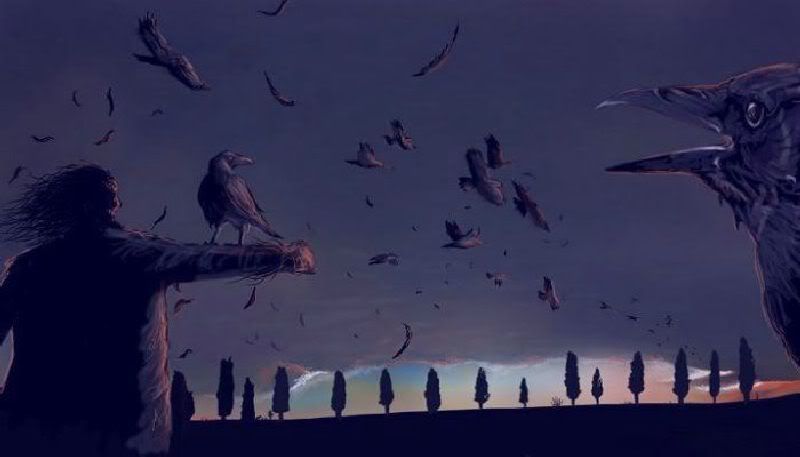(116) Birds react to human gaze
[ Anyone who ever stared at crows from a distance will know, but now scientists have discovered this fact too... ]
A new study of jackdaws shows that these crow-like birds react to humans watching them, changing their behavior depending on who is looking and how the gaze moves.
"Jackdaws seem to recognize the eye's role in visual perception, or at the very least they are extremely sensitive to the way that human eyes are oriented," said Auguste von Bayern one of the study's authors from the University of Oxford.
The study, published in Current Biology, found that hand-reared jackdaws took significantly longer to retrieve food if a human was staring at the food than if the person was looking away. The bird would only react in this way if the person was a stranger and therefore potentially threatening.
The jackdaws were also able to interpret certain eye movements and hand gestures from the humans to find food that had been hidden, such as finger pointing or moving eyes. The jackdaws were unable to read communication that was static, however, such as an unmoving stare or a tilted head.
The discovery is particularly surprising since other intelligent species, like chimpanzees and dogs, have been found to be insensitive to staring or eye movement, according to von Bayern. Instead, these species appear to depend on other forms of communications, such as head or body orientation or movement. They do not appear to comprehend eyes as communicative organs.
"We may have underestimated the psychological realms of birds," von Bayern said. "Jackdaws, amongst many other birds, form pair bonds for life and need to closely coordinate and collaborate with their partner, which requires an efficient way of communicating and sensitivity to their partner's perspective."
The researchers hypothesis that jackdaws respond to human eyes, because unlike many species they use eyes to communicate with each other. Similar to human eyes, jackdaws' have a dark pupil surrounded by a white iris.
Jackdaws are corvids, the same genus as crows and ravens, and are one of the smallest birds in this genus. Highly sociable, they live in large hierarchal groups and are one of the only known species to have been observed giving and sharing food frequently.
http://news.mongabay.com/2009/0406-hance_jackdaws.html
A new study of jackdaws shows that these crow-like birds react to humans watching them, changing their behavior depending on who is looking and how the gaze moves.
"Jackdaws seem to recognize the eye's role in visual perception, or at the very least they are extremely sensitive to the way that human eyes are oriented," said Auguste von Bayern one of the study's authors from the University of Oxford.
The study, published in Current Biology, found that hand-reared jackdaws took significantly longer to retrieve food if a human was staring at the food than if the person was looking away. The bird would only react in this way if the person was a stranger and therefore potentially threatening.
The jackdaws were also able to interpret certain eye movements and hand gestures from the humans to find food that had been hidden, such as finger pointing or moving eyes. The jackdaws were unable to read communication that was static, however, such as an unmoving stare or a tilted head.
The discovery is particularly surprising since other intelligent species, like chimpanzees and dogs, have been found to be insensitive to staring or eye movement, according to von Bayern. Instead, these species appear to depend on other forms of communications, such as head or body orientation or movement. They do not appear to comprehend eyes as communicative organs.
"We may have underestimated the psychological realms of birds," von Bayern said. "Jackdaws, amongst many other birds, form pair bonds for life and need to closely coordinate and collaborate with their partner, which requires an efficient way of communicating and sensitivity to their partner's perspective."
The researchers hypothesis that jackdaws respond to human eyes, because unlike many species they use eyes to communicate with each other. Similar to human eyes, jackdaws' have a dark pupil surrounded by a white iris.
Jackdaws are corvids, the same genus as crows and ravens, and are one of the smallest birds in this genus. Highly sociable, they live in large hierarchal groups and are one of the only known species to have been observed giving and sharing food frequently.
http://news.mongabay.com/2009/0406-hance_jackdaws.html

![[Go to Site Index]](http://i6.photobucket.com/albums/y225/Abramelinn/Banner_Crow4.jpg)

<< Home